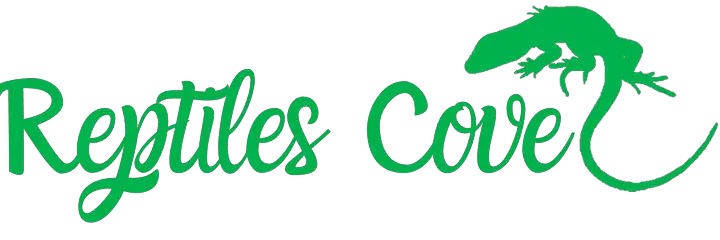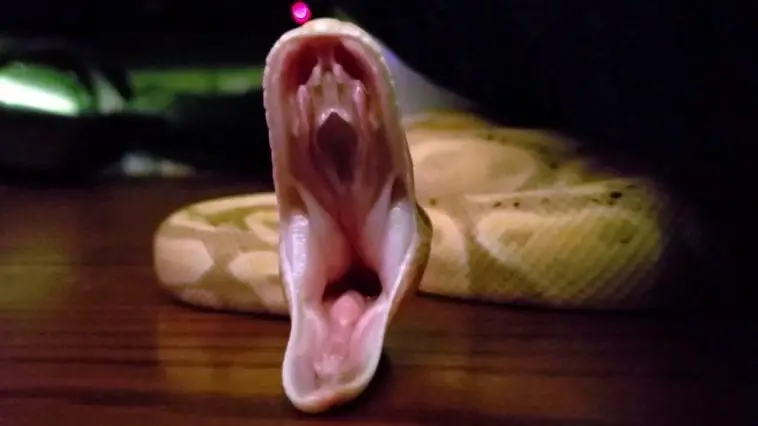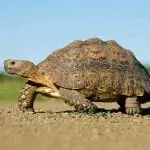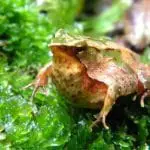If you have a pet snake, you might see it opening its mouth as wide as it can from time to time. Is this equivalent to a snake being tired? Is this equivalent to a snake attack? Here is what you should know about snake gaping.
What Is a Mouth Gape Or A Yawn?
Understanding why animals yawn has been something that science experts debate on. There are potential linkages to tiredness, illness, and needing oxygen to breathe. However, scientists believe that yawning is related to temperature regulation in the brain.
This hypothesis is called the brain cooling hypothesis. Yawning and mouth gaping increases the blood flow in the head and brings in cool air so that blood flow in the body can be cooled, including the spinal fluid. Eventually, the cooled down fluid cools the brain, too. This can also explain why yawning can make you feel that you are more awake and why you are more likely to yawn after spending hours of being mentally or physically active.
The Basic Things To Know About Snake Gaping

Ultimately, when it comes to yawning in all animals, scientists cannot seem to decide between social cues and physical cues. Another issue that can be confusing is that according to some evidence, different animal species have their own reasons for yawning.
When it comes to snakes, there are general explanations for yawning. These are the things that you must know. Snakes have large jaws that can open up so wide sometimes. It can seem to look like a basic snake yawning for them because it is feeling tired, but in reality, this is not the case. Snake yawning, or mouth gaping, happens for many practical reasons.
It can be believed that snakes use this to take cues from their environment, which includes being able to smell some prey that is nearby. Some snake yawn to stretch out their jaws before, after taking a meal, and after resting for a long time. Snakes will also do some gaping to get more air into their lungs when they are sick because of a respiratory infection and Inclusion Body Disease.
Of course, mouth gaping in snakes can happen for a different range of reasons, and it requires careful observation and analysis so that you can find out exactly why. The reason for yawning can be benign, but this can also be signs of an underlying illness that can be fatal.
Reasons For Snake Gaping

1. Routine Before Eating
Snake gaping can be a sign that your snake is feeling hungry. It can be something that a snake likes to do to prepare for its meal when it senses that you are about to feed them. As snakes eat their prey whole, yawning can be a warm-up for their mouths. Snakes are not equipped with incisors to cut into food, or molars so that they can break food down. Yawning is done by snakes because it resembles how the snakes have to stretch their jaws open in order to swallow their food whole. Yawning exercises
2. Routine After Eating
Aside from mouth gaping before eating, snakes also yawn after consuming their meals. If you anthropomorphize a snake, you may think that it gets tired after finishing their meals, but it is not really the case. The snake does his mouth gaping so that they can realign their jaws.
When a snake begins to consume its meals, it opens its jaws very wide. It then maneuvers it jaws forward, one after the other, in order for the snake to pull its prey inside. This thing might take several minutes, even for small prey, and will surely take so long for large prey.
This act stretches the snake jaws out. And while it can be impossible to know what a snake is feeling at the moment, this thing can still cause some sort of discomfort for the pet snake. This can also mean that the snake’s jaw can be out of shape. So, make sure that you know that one yawn after one meal is very normal.
3. Respiratory Infection
Sometimes, snakes gape when they are not getting enough air. This is because yawning opens the airways and allows so much more air into the snake’s lungs. Respiratory infections are bacterial and viral infections of the nose, lungs, and throat, which include symptoms of a heavy cold or flu.
Health problems like this can stop the snake from breathing very easily. And, the unique physiology of the snake means that it can connect the end of its windpipe or the glottis directly to its nose so that they can breathe easier. But, when the nose is blocked, the snake cannot breathe properly. When this happens, it opens its mouth to breathe instead.
If the respiratory infection is on a minor level, the snake might yawn occasionally. If the infection is being very intense, the snake might yawn very frequently, or it might breathe through its mouth at all times. You should watch out for this because this is a sign that your snake is really sick.
4. Inclusion Body Disease
Inclusion Body Disease is a viral problem that can affect snakes in captivity, especially for the constrictor types of snakes. While there is an available cure for respiratory problems, there is no cure for Inclusion Body Disease, and it is fatal for snakes. The symptoms that you can watch out for are head tremors, loss of appetite, head tremors, and pneumonia.
It can also come with a symptom called stargazing. This is the term used to describe when the snake lifts its head to look upwards in a fashion that looks a little involuntary. It may also act like a corkscrew when it tries to feed, which is where it will attempt to strike you, but miss. The symptoms include mouth gaping.
5. Chemical Cues
Though a snake is unable to sniff by using its nose, it has a different organ that it uses, which is called the vomeronasal organ. This can be found at the roof of the snake’s mouth. The snake can use this organ by flicking its tongue.
When the snake presses its tongue to the vomeronasal organ, it can detect the pheromones and the chemicals that its tongue has picked up.
It has been observed that a snake uses its vomeronasal organ so that it can yawn. When the snake gapes its mouth, the pheromones hit its vomeronasal organ, and the action helps the snake find its mate, find some food, or whatever item or place it is looking for nearby.
Sometimes, you should take note that a snake might yawn whenever it is exposed to a different environment. The snake sniffs its environment to see if there are any threats or food sources nearby.
6. Stretching
Stretching is another similar behavior that snakes do that is very similar to yawning. Snakes usually do this after immobile periods that they spend after long periods of day or night.
Though this action is quite impossible to identify or observe while looking, the stretching behavior is likely to be equal parts sleeping and equal parts resting that helps to conserve energy.
Either way, when a snake starts to move and stretch, it might also appear that the snake starts opening its mouth. This behavior is very similar to how humans stretch when they wake up or when you have just started after a long time of sitting down.
Snakes do this because they have to stretch their muscles after they have been immobile for a long period. Even for snakes, extended periods of immobility can cause tension, tightness, restricted movement, and stress in the muscles and pain. Stretching can help them in dealing with these issues.
7. Unknown Reason
If you are realistic, it really is impossible to tell why a snake is gaping its mouth. However, you cannot ignore that mouth gaping is an intense symptom of an underlying illness. You should assess the following items:
- Check how often your snake yawns multiple times in a straight row, or whether it continues to do so constantly.
- Check if the time is approaching that you begin feeding your snake.
- Check if there is a new thing or item in your snake’s world, which can be the reason why your snake might be trying to sniff around.
- Check if your snake does not have any symptoms of IBD or any respiratory infection.
- Check if your snake is behaving normally and at its best. Watch out for something that is an unlikable behavior.
Always allow yourself to cross-check all the symptoms of your snake as everything would tell you why your snake is gaping its mouth. The underlying reason might not be something intense that will not affect your snake’s health, but it is still important to be prepared for anything. If you are feeling nervous and unsure, set an appointment with your trusted veterinarian so you can air all your doubts and clear all ill feelings out.



